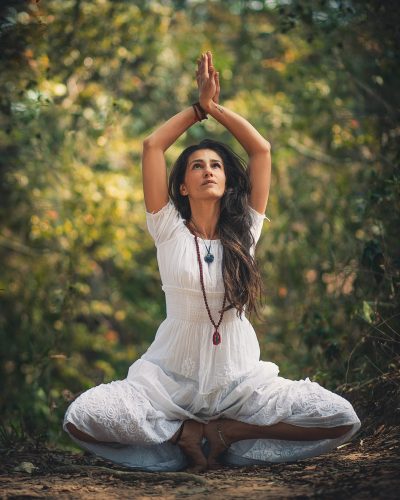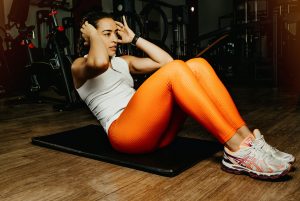5 Reasons Why Yoga Is Good For Singing
Do you ever feel constriction in your voice? Do you suffer from tension? Do you sometimes feel that your face, neck, or shoulder muscles are tense and rigid? Perhaps other muscle groups in your body also feel tight and restrained? Did you know that yoga is good for singing? Did you know that it can help you get rid of all this tension and dramatically improve the way you sound?
What is Yoga?
Yoga is an ancient form of exercise, which originated around 5,000 years ago in India. It focuses on strength, flexibility, and breathing to help you improve your physical and mental wellbeing. There are different styles of yoga. Some are more vigorous than others. So, before you start exploring yoga for singing and unroll your exercise matt, make sure to choose a style, which is appropriate for your fitness level.
How yoga can help you become a better singer
Deep, conscious breathing is a fundamental element of yoga practice and as a singer you are likely aware of the importance of proper breath control. So, when thinking about the benefits of yoga, the first thing that comes to mind is that yoga may help to improve your breath control for singing. However, this is not entirely true. Speech pathologist Joanna Cazden shares some important guidelines to keep in mind when it comes to yoga and singing, as published on SingerUniverse.com:

First, the singing breath does not use the balanced, equal-in-and-out rhythm common to most yoga teaching. Voice production requires a very swift inhalation followed by a long, slow exhalation. You do this automatically when you talk, but it takes practice to quickly inhale enough to sing and then exhale very gradually. Try occasional cycles of breathing in fast and out slow during your asanas, with a relaxed throat, to reinforce this asymmetrical rhythm.
Second, some yoga teachers train a particular sequence of inhalation, such as drawing air into the belly first, then the waist, then the upper chest. These techniques are not harmful, but when singing, you don’t have time to inhale in stages—the whole breath system must open simultaneously. Again, just being aware of the difference can help you switch gears from yoga practice to vocal rehearsal.
Third, the vocal cords are vulnerable to dryness and fatigue when vigorous forms of audible breathing, sometimes called ujaya, are focused in the throat. The louder the breath sounds and the longer such practice, the greater the risk of vocal cord irritation. If you do this type of pranayama, place the friction higher, near the soft palate, and allow at least half an hour of rest before vocalizing.
If yoga doesn’t automatically translate into an improved breath control for singing, what ARE the benefits of yoga for singers?
1. Stress, anxiety, and tension relief
Deep, conscious yoga breathing will help you create a harmony in your body and mind and relieve tension. Whether you are practising at home or singing in front of an audience, a relaxed nervous system is a core requirement for great sound production. So, if you are prone to tension caused by stress and anxiety of everyday fast-paced living, taking up yoga might be of benefit.
2. Improved memory and mental focus
According to a study published in the Journal of Physical Activity and Health, yoga may improve brain functioning more than aerobic exercise. The study author, Neha Gothe, an exercise psychologist, observed that during a yoga practice we focus on our breath and are mindfully aware of our postures. These mental exercises also affect the way we think and focus outside of yoga practice. Most singers will likely agree that singing performances require not only reasonable levels of physical fitness, but also plenty of mental agility. So, if your memory for lyrics needs a booster then yoga may be the answer!



3. Improved strength, flexibility, and posture
Research shows that practising yoga can improve strength, endurance, and flexibility, all three of which are important elements in delivering effective singing performances. A great voice needs to be underpinned by adequate physical strength. Without this support, even the most beautiful voice will be of little use when the body tires quickly and is unable to carry it. Yoga poses and stretches make the body stronger and more flexible, which helps to achieve the most optimal posture for singing.
4. Promotes healthy eating habits
It’s amazing how different a voice can sound when it comes from a healthy body. And because our diet plays an important role in maintaining a healthy system, following a healthy eating plan can be greatly beneficial. Since yoga places huge emphasis on mindfulness, some studies show that it may be used to promote mindful eating, which in turn will help to keep your body in check and get the most out of your voice.
5. Improved sleep quality
Poor sleep quality has been associated with several health conditions, including obesity, high blood pressure, and depression, among other disorders. Physical and mental wellbeing can have a massive impact on the voice.
Most singers will agree that even minor health troubles or simply feeling under the weather can greatly influence the way their voices sound. Whilst sleep alone is not the answer to improving all health conditions, it certainly plays an important role in helping to maintain a relatively healthy body and mind.
However, sleep doesn’t always come easy to everyone and if you are one of those who struggle to fall asleep or frequently wake up in the night, then yoga may be exactly what you need to benefit from the curing powers of sleep.


